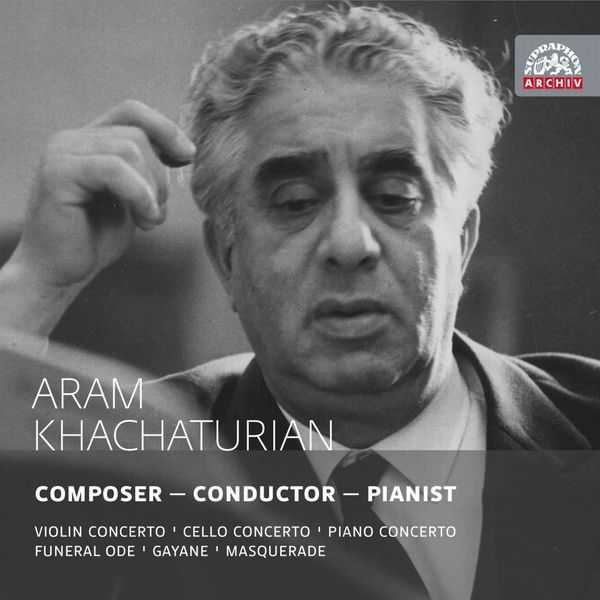
Composer: Aram Khachaturian
Performer: Aram Khachaturian, Leonid Kogan, Antonin Jemelik, Sviatoslav Knushevitsky
Orchestra: USSR State Radio and Television Symphony Orchestra, Prague Radio Symphony Orchestra, Czech Philharmonic Orchestra, Karlovy Vary Symphony Orchestra
Conductor: Aram Khachaturian, Alexander Gauk, Alois Klíma
Format: FLAC (tracks)
Label: Supraphon
Catalogue: SU41002
Release: 2012
Size: 452 MB
Recovery: +3%
Scan: cover
Concerto in D Minor
01. I. Allegro con fermezza
02. II. Andante sostenuto
03. III. Allegro vivace
Concerto in E Minor
04. I. Allegro moderato
05. II. Andante sostenuto / att. / – Allegro (a battuta)
06. III. Allegro a battuta
07. Funeral Ode in Memory of Vladimir Ilyich Lenin
08. Sabre Dance from Gayane
09. Song Garun Yerevan
10. Song ‘Zdravitsa’
Masquerade
11. I. Waltz
12. II. Nocturne
13. III. Mazurka
14. IV. Romance
15. V. Galop
Gayane
16. I. Dance of the Rose Maidens
17. II. Lullaby
18. III. Aishe´s Dance
19. IV. Gopak
20. V. Sabre Dance
21. VI. Lezghinka
Concerto in D-Flat Major, Op. 38
22. I. Allegro ma non troppo e maestoso
23. II. Andante con anima
24. III. Allegro brillante
“I am firmly convinced that truly great music must in all its roots be linked with folk foundations, with the eternally youthful, inexhaustible sources of artistic folk creativeness.” With these words Khachaturian expresses more than a mere willingness (as a Soviet artist) to adhere to the communist party line and comply with the declared aesthetic requirements of the time.
All his great works reveal his being inspired by folk music, Armenian and Georgian in particular, which shaped his thinking as a composer. Gayane, Masquerade and the Violin Concerto (here featuring a bravura performance by Leonid Kogan) need no introduction. Noteworthy too is the sterling delivery of the young pianist Antonín Jemelík in the recording of the Piano Concerto with the Czech Philharmonic Orchestra.
In a series of previously unreleased, newly remastered recordings from the 1950s, Khachaturian appears in the role of conductor, while several unique recordings capture him singing his own songs in Armenian by the piano. Soviet composer, conductor and spontaneous musician – the three faces of Aram Khachaturian.
This collection of music by Armenian Soviet composer Aram Khachaturian is even more specialized than its subtitle, “Composer-Conductor-Pianist,” suggests. For one thing, all the material is Czech related; most of it was recorded in the former Czechoslovakia, and the remainder was sold there and came from the vaults of the Supraphon label. The CD booklet credits one Patrick Lambert, who also wrote the notes, “for his invaluable suggestions and for sharing with us his extensive knowledge of the Supraphon archives.” It’s not clear how he came by that, but he’s not the first outsider to know a company’s history better than the employees themselves. Anyhow, this is a fascinating blast from the past. The music was recorded between 1950 and 1960, and sound quality is marginal, but there are some real oddities here. Chief among them has to be the presence of Khachaturian as vocalist in a couple of songs on CD 2 (tracks 2 and 3); one of them is entitled Springtime in Lovely Yerevan. Musically the major interest lies in Khachaturian’s recording as conductor of excerpts from the ballet Gayane, including the famous “Sabre Dance,” with the Karlovy Vary Symphony Orchestra in a 1955 live recording. There is no shortage of recordings of this work, but this one, taken at breakneck speeds, crackles with excitement. There are also some more unusual pieces. The Piano Concerto in D flat major, in a slightly acid idiom quite close to Shostakovich, is played by Czech pianist Antonín Jemelík, who died at the age of 31. Masquerade, a suite from incidental music to a little-known (at least in Western countries) play by Mikhail Lermontov, shows Khachaturian in a more conservative, Tchaikovskian idiom; one or more of these attractive melodies could easily be paired in programming with the “Sabre Dance.” The recording is necessarily a mixed bag, but it’s recommended for aficionados of Soviet and Eastern European music.